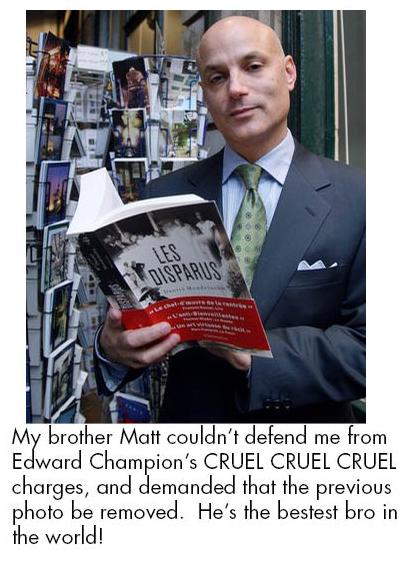It seemed strangely fitting to get punched by a hideous man in the solar plexus as I was on my way to see James Wood discuss David Foster Wallace’s Brief Interviews with Hideous Men at the 92nd Street Y on Monday night. The man was bald, with a sebaceous sheen having long replaced any wet shaved droplets from that morning, in his late thirties, walking fast, iPod buds piping what I detected as bland corporate tunes (perhaps David Gray) into his ears, looking to be fighting down, as Bret Easton Ellis once described of Patrick Bateman in American Psycho, “the urge to start slapping [himself] in the face.” For all I know, he had just murdered someone or maybe he hadn’t bothered to ask a loved one for a hug. But whatever his emotional paucity, he took it out on me in a New York minute. I was passing to his left in the 42nd Street corridor connecting several subways, and he went out of his way to jab me without reason. No provocation on my part at all. Didn’t know the guy. I imagined that he had just confessed his sins to an interviewer. Like the reader flipping through DFW’s “brief interviews,” I’d never be privy to the questions. And even if he confessed what seemed like a barrage of details to me, it would not be the entire story.
I bring this incident up not to arouse sympathy (none is required), but to point out that DFW’s “hideous men” remain alive and well. Decades from now, you will still find them manipulating women, roasting within their own violent realities and fantasies, and boasting to unseen interlocutors of their sins. On the other hand, if, as some hardcore DFW acolytes believe, the titular Brief Interviews are more reflective of a metaphorical author-reader relationship, something that is strongly suggested by DFW’s inclusion of “Octet” (whereby he presents a series of pop quizzes, only to have the author interrupt halfway through to go on and on about how the piece has failed, resorting to “tired old S.O.P. metafiction”), then perhaps my efforts to fuse reality with fiction begin to dissolve. Of this secondary type of reading (or is it the primary?), James Wood would have little to say, even when asked by an audience member, “How much meta can one tolerate?” (Wood’s reply to this question was that the reader could indeed lose his mind. “Of course,” qualified Wood, “it should drive us a bit mad.”) He would identify DFW as “a very moral writer,” pointing out that, in Brief Interviews, “There are real critiques of unpleasant and self-obsessed people.” But he would neither bring up the book’s elided questions (much less the Final Fantasy-style ellipses, the occasional italicization of the “Q.,” or the even more infrequent double questions represented only by the seventeenth letter of the alphabet, followed by trusted period), nor would he address “Octet.” But he would express a surprising enthusiasm for DFW’s work, often getting a bit giddy over specific sentences and phrases*, and prove to have a greater grasp on the moral weight of this material than Zadie Smith.
 The occasion for this revisitation, as explained by a competently groomed gentleman (it was his somewhat eccentrically cut beard that caused me to wonder, and even worry a bit, about his grooming) named Bernard Schwartz (who thankfully did not resemble the man who punched me, although he did ramble on about “Mr. McEwan’s only New York appearance,” which, given my regrettable experience last week with Solar, the latest unreadable turkey squawking from the master’s great hand, seemed akin to boasting of Pauly Shore or Carrot Top headlining a standup comedy night of some long-lasting cultural import), was a 92nd Street Y series styled First Reads. Wood then emerged from behind the stage. (It is probably worth observing that all this was preceded by a prerecorded announcement indicating that cameras and recording devices were “strictly prohibited during the concert.” Given the musical connotations of this noun, I was a bit disappointed that Wood did not sing, play the drums, or play an instrument. He did, however, read DFW’s passages in a somewhat Shakespearean tone, of which he later expressed some doubts. And he was careful to qualify — this, no doubt addressed to the pro-audio book bloc within the audience, who was represented through one question on this subject, to which Wood expressed some polite contrarianism, pointing out, “I do like going at my own speed,” and observing quite rightly the fascistic speed (to be clear, the “fascistic” modifier is mine, not Wood’s; there may be additional modest embellishments throughout this report, which I shall do my best to delineate) prevented one from having a say in the manner — that if one insisted upon a precise aural intonation of the material, one could easily find any number of recorded files read by DFW to hear the appropriate pacing. He would also later note that reading DFW’s sentences aloud was akin to “playing a wind instrument.” And indeed, in light of the many layers of footnotes and commentary and protracted clause-laden sentences, there seems a clear justification to confine DFW’s sentences to one’s own head, and Wood is to be lauded for attempting to dissect the text in a way it was probably not explicitly designed for.)
The occasion for this revisitation, as explained by a competently groomed gentleman (it was his somewhat eccentrically cut beard that caused me to wonder, and even worry a bit, about his grooming) named Bernard Schwartz (who thankfully did not resemble the man who punched me, although he did ramble on about “Mr. McEwan’s only New York appearance,” which, given my regrettable experience last week with Solar, the latest unreadable turkey squawking from the master’s great hand, seemed akin to boasting of Pauly Shore or Carrot Top headlining a standup comedy night of some long-lasting cultural import), was a 92nd Street Y series styled First Reads. Wood then emerged from behind the stage. (It is probably worth observing that all this was preceded by a prerecorded announcement indicating that cameras and recording devices were “strictly prohibited during the concert.” Given the musical connotations of this noun, I was a bit disappointed that Wood did not sing, play the drums, or play an instrument. He did, however, read DFW’s passages in a somewhat Shakespearean tone, of which he later expressed some doubts. And he was careful to qualify — this, no doubt addressed to the pro-audio book bloc within the audience, who was represented through one question on this subject, to which Wood expressed some polite contrarianism, pointing out, “I do like going at my own speed,” and observing quite rightly the fascistic speed (to be clear, the “fascistic” modifier is mine, not Wood’s; there may be additional modest embellishments throughout this report, which I shall do my best to delineate) prevented one from having a say in the manner — that if one insisted upon a precise aural intonation of the material, one could easily find any number of recorded files read by DFW to hear the appropriate pacing. He would also later note that reading DFW’s sentences aloud was akin to “playing a wind instrument.” And indeed, in light of the many layers of footnotes and commentary and protracted clause-laden sentences, there seems a clear justification to confine DFW’s sentences to one’s own head, and Wood is to be lauded for attempting to dissect the text in a way it was probably not explicitly designed for.)
As I indicated before the last digression (and there will be more of them, I assure you), Wood emerged from behind the stage, dressed in unpretentious jeans and quickly divesting himself of his coat, and rolling up his shirtsleeves as if he was about to deliver a stump speech (I should probably note, at the risk of making this sentence needlessly long, that Wood’s position w/r/t DFW reminded me very much of the hard compromises reached by the Democrats to pass the health care bill, in the sense that he did not bring up irony at all — an ineluctable quality when considering DFW at any stage in his career — but was careful to note that here was a major author; and as I implied earlier, the gentlemanly Wood was very good on Monday night to move beyond the “moral fiction”/”realism” concerns that he has been saddled with, wishing to judge the text for what it was, and he even brought up Beckett (handouts of Company could be found on chairs, along with an excerpt from DFW’s “The Depressed Person,” giving this correspondent the minor sense that he had accidentally stumbled into a classroom and was going to be ejected, perhaps punched without reason as he had been earlier that evening, by unknown administrative heads who would declare him a fraud, an impostor, a charlatan, a quack, an uncredentialed blogger (although he was credentialed for this event), an unthinker, and countless other nouns I could bombard at you but won’t, but this minor sense, which some readers may identify as either neurosis or paranoia, was swiftly obviated by Wood’s polite and invitational quality to engage with the text as he had) and David Markson, and the citation of these more experimental writers suggests very highly that Wood is not straitjacketed by the “hysterical realism” charge with which his critics have pegged him; so that watching Wood was a bit like smiling at the Democratic achievement the night before; it was not the ideal bill, but it was a good faith step forward, and, if one is to imply a binary value, a bipartisan effort between us (assuming the reader falls into my camp, the pro-stylists) and Wood (the realists), and the reason that this report must be so long is not in homage to DFW (although some will assume this report to be a desperate parody: if so, fuck ’em), but because there is, to my knowledge, no essay in the works in which Wood will memorialize his statements; ergo, your digressing and wisecracking correspondent’s ramblings on the subject). Having removed his carapace, and having placed his arms upon the cherry cedar lectern (where he would sometimes shuffle from one arm to another over the course of the next eighty minutes), Wood then proceeded to clarify Mr. Schwartz’s suggestion that he had “kindly agreed” to take questions from the audience. He said, “Indeed, I have graciously agreed to take questions.”
Wood noted that the series had been some time in the making, taking two years to get off the ground, and that the delay had been caused by “the David Lodgian reason of not having to admit” that one had not read a certain book (the reference here is to the game Humiliation, found within Lodge’s very funny novel, Changing Places, in which a professor ends up confessing that he hasn’t read Hamlet). But Wood, having established that he had read Infinite Jest, Oblivion, and “not read much else, except of the journalism,” indicated that DFW was “a writer I wanted to revisit anyway.” He was careful to clarify that “I don’t in any way present myself as a Foster Wallace expert.” He then noted, right off the bat, “what an extraordinary ear Wallace has,” and began to read numerous passages, most of them from the titular Brief Interviews. Perhaps Wood may wish to confirm this in the comments (if he’s even read this far or even cares what I have to say), but the sense that this correspondent had was that Wood was not only fond of Wallace’s numerical categorization (he seemed to enjoy saying “B.I. #30”), but of specific phrases. I have noted in the footnote below that he liked “chicken pesto.” But he also praised the repeated use of “blow out” in B.I. #31. After reading a passage, he said, “And when you read something like that, you think he’s got something.” He observed “the particular unpleasantness of that phrase,” noting its use as a builder’s term. He then spoke highly of “reciplicate” being used in “reciprocate.” And during these readings (again qualified with the footnote below), he would often say, “I’ll repeat that,” and read a specific sentence again.
He also admired the way that DFW had twisted Victor Frankl’s Search for Meaning in B.I. #46, pointing out that the perspective started off as “fairly normal,” until a rather peculiar moral interpretation of Frankl began to emerge throughout the text. He liked DFW’s distortion of the Nietzschean axiom (involving the carrying of a whip when you are around a woman) with the character noting “you have got to be careful of taking a knee-jerk attitude about violence and degradation in the case of women also.” B.I. #20 (near book’s end) contained one of Wood’s favorite phrases: “Nevertheless nolo to the charge that I spotted her on the blanket at the concert and sauntered carnivorously over with an overtly one-night objective.” To Wood’s mind, this conjured up a feeling of local pleasures and he offered an interesting comparative phrase from Norman Rush’s Mating: “This jeu maintained its facetious character, but there came a time when I began to resent it as a concealed way of short-circuiting my episode of depression, because he preferred to be merry, naturally.”
These were signs, Wood continued, of the “good American tradition” of capturing speech and consciousness. And DFW’s work was very skillful in capturing the “helplessness of the self.” To this end, going back to B.I. #31, Wood noted the way that “little lady” revealed a telltale condemnation, pointing out that the interview subjects’s inability to forget specific details was entirely the problem. To this end, he cited the blind character within “Yet Another Example of the Porousness of Certain Borders (XI),” noting that “even a little story like that” was enough to “think about the entrapment of solipsism.”
As I indicated above, Wood clearly relished reading these passages. “It’s a wonderful bit of writing, isn’t it?” he said, following one read. He noted that DFW’s stories were “funny and intolerable” and that these dual emotions likewise “entrapped you into two languages.” He compared this approach to Lydia Davis’s “intolerable spillage of the self,” as well as Thomas Bernhard, who was “also brilliant” with this approach. He then brought up Beckett’s Company (the aforementioned handout), which he used to compare against DFW, pointing out that DFW was carrying on in the tradition of “withholding and repressing what we would actually want to know” and that Beckett and DFW both depicted “a painful defense to not allow something to get into the text.” And he cited the language in “The Depressed Person” and “Signifying Nothing” as examples “very like Beckett” in the way that “artificial stiff language was holding back on the traumatic.”
But while Wood had many positive things to say about DFW, he criticized DFW for “sometimes playing his hand too obviously.” “Instead of being enigmatic like Beckett,” continued Wood, “Wallace spoils them by giving you the key.” To this end, he complained about the end of B.I. #46, where the subject says, “…and what if I said it happened to me? Would that make a difference?” And while Wood’s criticism on this small point is valid if one reads the “brief interviews” strictly with a literal realist narrative in mind (a perfectly valid approach, but one, I think, that underplays DFW’s achievement here), this perspective fails to consider that these interviews may represent the author-reader relationship, perhaps with the hideous man standing in as a fictional construct for DFW. Let us not forget that what the subjects in these “brief interviews” are saying is fictional, that what they declare may be boasting or may not, in fact, be true.
During the Q&A period, I attempted to signal Wood to address him on this particular angle. And when the session was over, I ran into the delightful Martin Schneider (of Emdashes; he has offered his own report), who had offered his own question concerning DFW’s tricks (I would highly advise reading Schneider’s report if you are interested not only in Wood’s response, but the exceedingly polite way in which Wood answered questions from the audience, including one bald gentleman, unrelated to the guy in the subway who punched me and not as well-groomed as Mr. Schwartz, who went on and on and on about Nabokov’s “Signs and Symbols” before the patient Wood found a pocket of time with which to quell this bald guy’s relentless Fidel Castro-like expatiation), I then approached Wood in the adjacent room, after carrying on an excitable and jocular conversation with Schneider and Sarah Weinman, hoping to get Wood to answer on this point. Wood, ever the deft and polite time allocator, diverted his attentions towards Schneider. The question was not answered. Despite waiting until the last possible minute to approach Wood, there were still people behind us who wished to shake his hand. But perhaps the issue might be taken up at a later point, due to the surprising detail and unanticipated length of this report.
Despite this minor caveat, Wood’s willingness to find passage into DFW, a writer he has previously expressed some reticence about, demonstrated to me that the First Reads program was a success. Certainly the audience of approximately seventy souls — ranging from those overfamiliar with the text to those who simply desired an answer about what “Datum Centurio” was about — all seemed to appreciate the talk. And I hope that the good folks at the 92nd Street Y (whether they be bald or well-groomed) will set up aesthetic oppositions of this ilk (setting up further surprise revelations) for future installments of the series.
(RELATED: Martin Schneider’s report. There is also another account at The Daily Snowman.)
* — He particularly liked the “chicken presto” dish found in “Signifying Nothing.” He also very much enjoyed reading sentences twice. Indeed, of the thirty-five minutes or so that he allocated to “discussing” DFW, it is safe to say that Wood spent much of the time reading, even repeating numerous sentences so that the audience could take in DFW’s magic.
 This life of the mind is fun stuff, as Powers has suggested to us throughout his work. But Wood is simply too married to the idea of characters as distinct individuals to smile. From How Fiction Works: “Even the characters we think of as ‘solidly realized’ in the conventional realist sense are less solid the longer we look at them.” The problem here is that Wood has failed to look long enough to see what Powers is up to. As Edmond Caldwell suggested
This life of the mind is fun stuff, as Powers has suggested to us throughout his work. But Wood is simply too married to the idea of characters as distinct individuals to smile. From How Fiction Works: “Even the characters we think of as ‘solidly realized’ in the conventional realist sense are less solid the longer we look at them.” The problem here is that Wood has failed to look long enough to see what Powers is up to. As Edmond Caldwell suggested 
 Wood offered some resistance to blogs, but confined his gripes to comments. “There, I think the rule is sanctioned ignorance,” said Wood. And while he outlined a generalized pattern of how people react to a review that I felt fallacious, the difference between Wood and Mendelsohn is that the former was willing to give the format a chance and try to understand it, while the latter was happy to nuke the site from orbit like an uninformed cretin.
Wood offered some resistance to blogs, but confined his gripes to comments. “There, I think the rule is sanctioned ignorance,” said Wood. And while he outlined a generalized pattern of how people react to a review that I felt fallacious, the difference between Wood and Mendelsohn is that the former was willing to give the format a chance and try to understand it, while the latter was happy to nuke the site from orbit like an uninformed cretin.